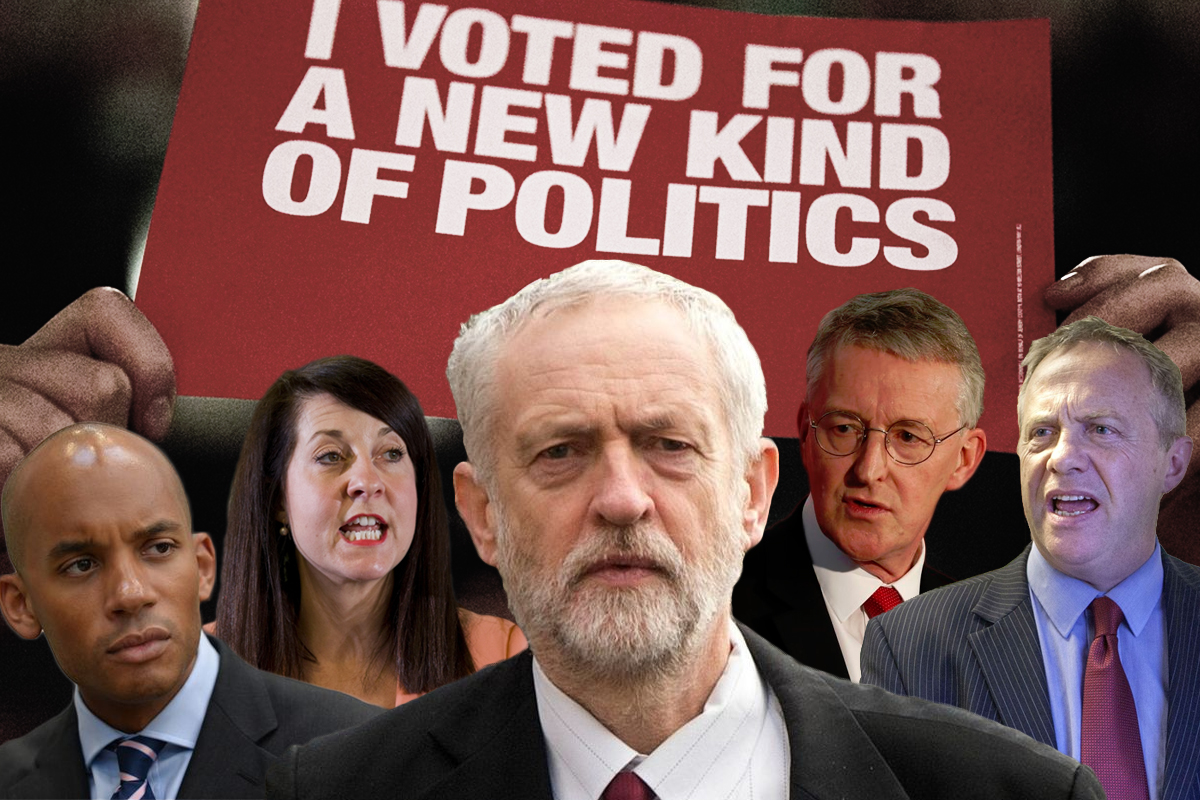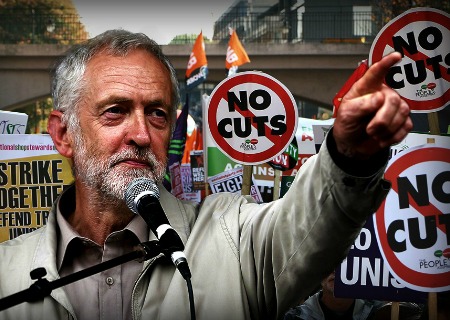The British comrades of Socialist Appeal received the following letter from a former member of the CWI's British section, the Socialist Party, explaining why the explosive events in the Labour Party under Jeremy Corbyn's leadership led him to abandon the sectarian route pursued by the SP and leave the organisation. He calls on his former comrades to do the same.
Lenin once wrote that we need not fear mistakes, but instead we should fear persistence in a mistake and a refusal to admit and correct it. This does not make writing an article that knowingly reveals my mistake in any way an easy task. However, with Lenin’s advice in mind, I do so here in the hope that it will be of benefit to those making the same mistake, persevering with it and refusing to admit and correct it.
I began to engage in political thinking at a time where the thought of joining the Labour Party was unattractive to say the least, given New Labour’s pro-capitalist policies, support for imperialist wars and introduction of tuition fees, for example. How could such a party, so dominated by the right-wing, oversee the revolutionary change to society I craved?
I instead joined the Socialist Party and spent several life-changing years with the party, developing my understanding of Marxist theory. Ultimately though, workers learn not through books but through experience.
The 2015 Socialist Party manifesto explained that the “Labour Party was founded by the trade unions over a century ago, in order to give a political voice to the organised working class. It has now completely degenerated and is another capitalist party.”
Now revolutionaries do not exist in a vacuum. They are subject to the pressures of capitalism, as with the class as a whole; and with the Labour Party seemingly dominated by the right-wing Blairites, I blindly followed the SP analysis. In their 2015 perspectives document they wrote:
“If Labour loses the election Miliband will be finished, but there is no strong candidate to replace him. What is clear, however, is that there would be no shift left.”
 "Blair attempted to reinvent the party as 'New Labour'. The attempt to break the Labour-trade union link, and transform Labour into a bourgeois party, has failed" / Image: MSC2014
"Blair attempted to reinvent the party as 'New Labour'. The attempt to break the Labour-trade union link, and transform Labour into a bourgeois party, has failed" / Image: MSC2014
Consciousness can lag behind the objective situation in the absence of a dialectical outlook.
Later in 2015, Jeremy Corbyn was elected as leader of the Labour Party. Workers and trade unionists flooded into the party as supporters to vote for him, and his election saw hundreds of thousands go on to join the Labour Party, making it the largest political party in Europe.
The analysis that Labour was a completely capitalist party was proved to be incorrect. Under the hammer blow of events, and a slice of luck handed down by the over-confident Blairites, the rank-and-file workers instinctively either returned to the Labour Party or joined for the first time. This, in the last analysis, defines the real class character of the party.
It became clear that, although the working class does not always move in a straight line, or always draw immediate revolutionary conditions, such a big event completely obliterated the past prejudices created by Blairism. When the working class moved politically, it did so instinctively towards its traditional mass organisations.
Blair attempted to reinvent the party as “New Labour”. The attempt to break the Labour-trade union link, and transform Labour into a bourgeois party, has failed. The party, despite the rightward shift of the past, has proven to still be based on the unions and, in the final analysis, on the working class.
It is now clear that the main struggle for the future of society will be fought within the Labour Party and the trade unions. The SP have failed to heed the advice of Lenin and admit their mistake in analysing the Labour Party as a capitalist party. The right-wing control over the party was due to certain objective conditions. These conditions, mainly an emptying out of the workers’ organisations and an ebb in the class struggle, were largely determined by a prolonged boom, which has now come to an end. Given the opportunity to rise up against this, the workers moved towards the Labour Party.
Their failure to recognise this, or at least openly admit it, means that with a heavy heart I have been forced to leave the SP rather than continue along the road of sectarianism, which I now recognise was the road I was taking. As Trotsky explained:
“Sect is a term I would use only for an organisation of a kind that is forever doomed, by virtue of its mistaken methodology, to remain on the sidelines of life and of the working class struggle.”
As Rob Sewell explained in his piece entitled ‘Reject the blind alley of sectarianism’, in failing to recognise and adapt to the objective situation, the SP will continue to operate on the fringe of the movement and fail to have an impact in successfully bringing about a socialist change of society.
On the basis of events, the right wing will continue to be squeezed out of the LP and the left will continue in the ascendency. Though success is not unequivocally guaranteed, it is undoubtedly now the task of Marxists to “patiently explain” and fertilise this left wing with revolutionary ideas from within the mass organisation itself.
 "Socialist Appeal was correct in taking the long view of history... uncovering the underlying contradictions in the situation within the LP, which eventually broke to the surface" / Image: Socialist Appeal
"Socialist Appeal was correct in taking the long view of history... uncovering the underlying contradictions in the situation within the LP, which eventually broke to the surface" / Image: Socialist Appeal
Developing a Marxist tendency as an integral part of the Labour Party is vital. This was the case with the only Marxist group that made any real impact in the Labour Party: the Militant tendency, forerunners of both the SP and Socialist Appeal, founded by Ted Grant in 1964. Ted explained that what was needed was consistent, patient work in the mass organisations. Ted’s analysis has proven true.
Socialist Appeal was correct in taking the long view of history as laid down by Marx’s teachings, uncovering the underlying contradictions in the situation within the LP, which eventually broke to the surface. This is the whole essence of dialectics, which sees things not as static entities, but as contradictory processes. Indeed, the whole history of the labour movement reflects the ebb and flow of the class struggle. In the past period, we have been affected by a prolonged ebb. The period we are entering will be fundamentally different. The SP must now recognise this.
Both Marx and Engels explained that the task of the emancipation of the working class was the task of the working class itself. If the Marxists were going to influence the workers’ movement, they should not set up their own sectarian barriers, but participate in the real movement and go through the experience shoulder-to-shoulder with the workers. Marx and Engels outlined this clear approach long ago in the Communist Manifesto:
“The Communists do not form a separate party opposed to other working-class parties. They have no interests separate and apart from those of the proletariat as a whole. They do not set up any sectarian principles of their own, by which to shape and mould the proletarian movement. The Communists are distinguished from the other working-class parties by this only: 1. In the national struggles of the proletarians of the different countries, they point out and bring to the front the common interests of the entire proletariat, independently of all nationalities. 2. In the various stages of development which the struggle of the working class against the bourgeoisie has to pass through, they always and everywhere represent the interests of the movement as a whole.”
If the SP now recognises, as it must surely do, that the LP is indeed the mass organisation of the workers, it therefore follows that its past analysis is incorrect and attempting to form another mass workers’ party directly conflicts with the writings of Marx in the Communist Manifesto.
Trotsky said:
“The mole of revolution is digging too well this time! The masses will liberate themselves from the yoke of national conservatism, working out their own discipline of revolutionary action. Under this pressure from below the top layers of the Labour Party will quickly shed their skins. We do not in the least mean by this that MacDonald will change his spots to those of a revolutionary. No, he will be cast out…. The working class will in all probability have to renew its leadership several times before it creates a party really answering the historical situation and the tasks of the British proletariat.”
I therefore appeal to all SP members and the wider layers of workers and youth to join me in this fight within the Labour Party. That fight may well go beyond the leadership of Corbyn as the rank-and-file move further left. But one thing is now clear: it will certainly not take place outside of the LP. Events have proven that to be the case.
Finishing with a quote from Trotsky is always a favourable way to bring an article to a close:
“We are fighting for genuine scientific ideas and principles, with inadequate technical, material, and personal means. But correct ideas will always find the necessary corresponding means and forces…There was never a greater cause on earth.”
